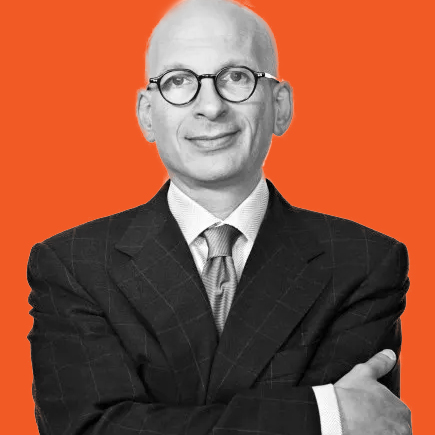Entrepreneurs know that business growth isn’t always on a high trajectory and sometimes, it takes more than forcing it upwards to really make it work. Erik Luhrs, also known as the Bruce Lee of revenue generation, talks to Meny Hoffman about working on both the internal and external factors to make a business work. Erik says that most of the time, people look at entrepreneurship as just making money, doing everything to get more sales and revenue but oftentimes, people forget that you have to look from the inside-out. Starting from within, entrepreneurs must be able to pinpoint what caused their business to plateau and address it by doing things out of their routine.
How to Get Concrete Results With Out-Of-The-Box Thinking—with Erik Luhrs
Do you have a big vision for your business or brand, but have hit a plateau that you just can’t overcome?
This week’s guest is Erik Luhrs, the creator of the company Revenue Kung-Fu, where he provides business coaching for stagnating entrepreneurs and experts who have tried everything, but are still feeling stuck. Erik is also the author of Be Do Sale: How To Create More Sales Right Now, Regardless Of What The Competition or the Economy is Doing, Using the GURUS Selling System!
In our interview, Erik explains why you need to dig deeper within yourself and understand what you truly want in order to get to the next level. Erik shares practical ideas to help you focus inward in order to transform your outward reality and become the best version of yourself. Erik also explains his GURUS Selling System, and how It will help you become much more efficient at sales.
There are so many golden nuggets of information that I don’t want you to miss. Without further ado, here is my interview.
—
Erik, thank you for joining me on the show.
Thanks for having me, Meny.
We are together in a mastermind group, which is a conversation on its own. When we mention that, people ask, “Mastermind? Is it worth it? What is it all about?” We could get in there, but there’s so much to discuss why I invited you to the show, so we’ll leave that for another time. We got to speak one-on-one and we went through an exercise about a business owner hitting a plateau and trying to get them unstuck. We had a great conversation and right after the conversation, I said, “I got to bring you on the podcast because our readers will enjoy the no-nonsense advice.” Before we get into the full context and the content that we want to discuss, tell our readers a little bit about yourself and your history, so they know what to expect or not to expect.
I grew up between New York and New Jersey. I started in Corporate America and in ten years there, I started as a temp in a mailroom. By the end, I was a contractor for the US Government. Back when the INS was still a thing, I had 120-plus people reporting to me in the big office, my executive assistant, and all that happy stuff. I left there and became a management consultant for several years. I burnt out of that and started a whole bunch of home-based businesses. I ended up becoming a business coach around about 2005 then I developed the GURUS Selling System around about 2009 after I’d been studying a number of different systems like neuro-linguistic programming, Silva Mind Control, etc.
Over the course of the past several years, from there, I evolved as I became more fascinated with the subconscious mind and then the superconscious mind, what is outside of us as opposed to what’s deep inside of us. My methodology has grown from GURUS to Subconscious Lead Generation to Peerless Positioning. Ultimately, what I do now is Revenue Kung-Fu which is a combination of everything I’ve done before. To put it in the simplest terms, I help people grow their businesses by working on both the external and the internal things that they do.
LTB 80 | Internal And External
Be Do Sale
Let’s dive in a little bit on your last statement about the external and internal. For people reading and general business owners, I always say we all suffer from the shiny object syndrome. “What is the next big thing? What can we do here? What can we do there?” Sometimes, they forget about their internal and understanding what’s going on. What is their comfort zone? What is out of their comfort zone? What do they want to see out of the business? What do they want to see out of themselves? Walk us through the importance of that, and then what it does for the person that wants to go there?
What does the system do for somebody when they go deeper? Is that what you say?
Correct.
I love Abraham Hicks. Hopefully, some of your readers will know who that is, but if not, Google it and you’ll find a gazillion Hicks. Abraham is a group of non-bodied entities that come through a woman named Esther Hicks. Abraham says, “Everything you want in life is because you think it will make you happy. It can be the physical shape of your body, a certain amount of money in your bank account, somebody else in your bed, a certain house or car. Just go for happy, and then everything else will show up.” When you go inside, you start to realize that the whole point of this is you’re continuously trying to find new ways to make yourself happy.
I’ve known depressed billionaires. He would say, “Monetarily, this person has hidden out of the ballpark. They have a yacht for every day of the week on every continent. They can go anywhere and can do anything. They never have to worry about money.” The way most people are brought up is we’re made to believe that somehow money is the answer to everything. Money is a way to pay for stuff, but we put it on a pedestal because we put it on a pedestal, we take our eyes off everything else. The whole thing was the money was just supposed to be a means to an end and we’re trying to get to happy.
When you go inside and start focusing on things that will make you happy, you find happiness. Happiness isn’t just running through a field of daisies and smiling blissfully. If you’re on LSD, it is. In reality, you want to find new ways to express yourself and experience yourself. Once you’ve done something once, it’s great and you go somewhere. You have an incredible steak and you’re like, “It’s the greatest steak I’ve ever had.” The 5th or 6th time you go back there, you’re taking your friends and you’re saying to them, “Isn’t this the greatest steak ever?” One of you is like, “I’m already getting tired of this thing. I could go for some chicken.” That’s what it is. We want more experiences, but we want to feel it inside. That internal work sets us up for what we should be doing on the outside. As long as you’re cycling through from inside to outside, you’re happy. What happens is too many people get stuck on the outside, and then they go, “I don’t know why I feel empty on the inside.” It’s because you probably haven’t visited there in a long time.
Talk a little bit about that. Meaning to say there are many people out there and I’ve spoken to many people throughout the years where they would say, “I’m feeling empty inside.” When you start saying, “How’s your life?” “Great. Family, kids, job and everything else.” Everything is working out perfectly fine and there’s a disconnect. Why is that?
It’s all external. Think about what the response was. “I have a wife, family and kids. I have a great business. I have a nice car. I went on a nice vacation.” It’s all outside. It’s all external stuff. It’s beautiful. I love it. Everybody loves having that stuff. I grew up in poverty. Trust me, not having that stuff sucks. You can have an abundance of roaches, I know. What you’re looking for is you have those things because society and the people you grew up with and everything, you created these pictures in your mind of, “This is how I’m supposed to be and this is what’s supposed to happen. This is the path I’m supposed to go.”
It’s like copying somebody else’s artwork. You can have somebody come and they can make a pristine copy of the Mona Lisa down to the smallest detail. You can hang it above your fireplace and look at it. You can even get a frame that looks exactly like the frame in the Louvre. It’s almost the same but it’s not. You will never Michelangelo painting that thing. For those who don’t know, the Mona Lisa is technically not a completed painting. You weren’t Michelangelo having the experience of it or the person who paid for him to paint that painting of his wife.
You’re so far removed and now it’s a copy of a copy. If you look at all of us, you grew up, get married, and have kids. Your kids grow up, get married, and have kids. It’s like a universal Xerox machine kicking out the same person over and over again. “Why don’t I feel complete?” Because that was a model to experience, but that’s not the end. We’ve heard it a million times, “Life is a journey and not a destination. Enjoy the journey.” You think, “Cheesy crap on a mug.” The fact of the matter is that’s what it is. It’s like, “I haven’t had this experience before.” Only through those experiences that you’re growing as a person.
When you’re lying on your deathbed and your life flashes before you, I would hope that God doesn’t flash by in a split second and say, “That’s all that there was?” You want to remember every nuanced, little weird thing that was like, “The time I was there and I got drunk.” For those who would know him, Jan-Michael Vincent was an actor in the ‘70s and early ‘80s. He was Airwolf and he was my idol. I had the opportunity by pure happenstance to get drunk with Jan-Michael Vincent in 1991. He and I are sitting on top of a chest full of Budweiser beers at a barbecue in Beverly Hills. I’m not making this up. It’s those little nuanced things. I could have easily been like, “Instead of being on vacation, I should have been at work making more money.”
Those little weird things like a person you meet on vacation. Your boat breaks down somewhere else in the lake and you meet some new person. Maybe you never see them again, but they say a bit of wisdom to you that haunts you for the rest of your life. You say, “I went to the Eiffel Tower. I saw Buddha in Cambodia.” All the big things, the postcard-y things are all nice, but it’s the things that never make it onto a postcard. That makes up the nuance of our life. It doesn’t matter how much more money I’ll ever make in my lifetime. I would never be able to buy sitting on that cooler and getting drunk with Jan-Michael Vincent ever again in my life. It just happened.
It’s something that we always have to know that every single day and evening, we have to ask ourselves, “What have I done today that will make a memory on a deathbed?” You’ve won another thing that goes on that list, so to speak. It’s not a routine. It’s not doing it. It’s making a difference and being able to be remembered for that. I want to ask you a specific question. We started off with those businesses that hit a plateau and there are many of those out there. Usually, it’s getting unstuck and it’s the business as a whole. As you go into those businesses and deal with a lot of those business owners, what are the common things that lead up to a business hitting that plateau? Let’s talk about some of the solutions.
Most times, when businesses get stuck, it’s because they’ve run the playbook. They’ve been there and done that thing. They started up and got their minimally viable product, whatever that might be. They started selling it and reached a certain plateau. Maybe they started doing LinkedIn strategies, Facebook strategies. That bumped them up some more and they started getting to the point of diminishing returns. They say, “Now I have a YouTube, Facebook and LinkedIn strategy. The Instagram strategy and direct mail didn’t work for me.” They hit the wall on all the known things, the things that everybody else can tell you to do.
LTB 80 | Internal And External
Internal And External: Happiness isn’t just running through a field of daisies and smiling blissfully.
By the same token, there are people out there doing YouTube and are making $10,000 a month. There are people doing YouTube and making $10 million. A little bit of that has to do with scale. Etsy has the ability to do a lot more off of a YouTube thing than a bunch of bigger companies like Handyman Dan. When I say the size of the organization, that scale piece also comes back to an individual and that is who are you being? At a certain level, you’re thinking of certain ways and offering certain offerings, solutions, etc.
In our world of coaching and consulting stuff, people say, “If you’re not doing a group program, do a group program. If you’re only doing one-on-one, do a group program.” That pumps me up a bit. “If you’re not doing a group, you can do a low-ticket thing and high volume of profit.” What are the little tactics? You get a little bit more money, etc. You’ve hit up that wall again of like, “I’m working 75 hours a week and diminished returns on everything. I’ve maxed everything out and I’m at $480,000 a year something.”
At that point, you have to evolve yourself into the next version of yourself because there are infinite versions of ourselves out there. There’s a version of you out there that can easily be raking in $1 million or $5 million a year, but that person isn’t the person looking at you in the mirror right now. That’s when you got to start going real deep inside because you maxed out all the external stuff. You’ve maxed out all the strategies and the tactics. All of the sudden, you go internal and say, “I don’t want to work with these types of people. I want to work with these types of people. I don’t want to be the guy who’s the solution guy anymore. I want to be a portal guy.”
If you sell light bulbs and all you’ve ever done is sell light bulbs. All of a sudden, you say, “I don’t do lighting fixtures, but I can start outsourcing lighting fixtures.” Now that I think about it, people are going to need electricians for lighting fixtures. When they get the electricians in there, the wall coverings will determine the efficiency of the lighting. One other aspect of lighting is windows. All of a sudden, you can say, “It’s not all about the light bulbs anymore and my little piece of it. Now I can interconnect with people. If I go bigger, I can start talking about the energetic value of light in your home, how it affects creativity, and how it affects your emotions and makes you happier.”
That was going to come from the person who said, “I want to sell more light bulbs.” They had to go inside and say, “What is light? What is light about? What am I about?” People are like, “Erik, how could you possibly take a transactional thing like light bulbs and turn it into something massively expensive?” I just pulled that entire thing out. Everybody is like, “Erik must have done this.” No. That’s what I’m saying. That potentiality is within you. When you hit a wall, evolution starts inside and then expands outside.
What would be some practical advice for a person to do this exercise? If they want to get into that deep understanding and they want to go from doing it into that moment, that will open them up to a totally different you, what is some practical advice? How does a person do that?
One of the first things I tell people is to break context. Let’s take our light bulb guy. He has a small warehouse and has his office in the warehouse. Everyday he goes into the office and he’s there from 9:00 to 5:00. I want you to figure out how to be a brand-new person. Larry Singer taught me many years ago, “Environment is stronger than will. Get out of there. Go to a park you’ve never been to before. Go on a vacation.” For creativity, a lot of people would say, “Great. I’ll take my family out.” No. As much as we love our family, families take attention and attention detracts from your ability to go within. If your kids are yanking on your arm saying, “Let’s go jump in the pool,” you’re not thinking about what you want to do in business. Go somewhere new.
I was asking one of my classes, “What is your wildest dream about yourself that you would never tell anybody? Maybe your wildest dream that you’ve never even thought of before?” You sit there and you might have the stupidest and silliest ideas. “I want to be a can-can dancer. I don’t want to be a can-can dancer,” but it pops into your head for a second. You laugh at yourself. It’s a dumb idea after dumb idea. To bring this to something people might know there’s the old exercise about headlines. They say, “Go write 100 headlines. Your first ten will be awful and the next 70 will be horrible, but then somewhere around number 80 starts to hone in and make sense. Those last twenty are probably gold.” The first ten are generic and the rest are like, “I don’t know what the hell to say.” It’s roughly the same thing. You sit there and let your mind go. It’s going to pull all sorts of oddball things, and then you’ve got to work through it. It’s like junk. You’ve got to clean that out of the pipes. All of a sudden, “Let me think.” Your light bulbs go into light fixtures. There’s a connection. Light fixtures need electricians. Light bounces off walls. These walls are a thing. Walls are in a house. Windows are letting light.
You’re then like, “At a practical level, how can I find out people who do these things and I can cross-market for them? What would be a deeper context of this? I’ve thought of the external things that I can do with these things, but what would be an internal thing at a higher level, a meta thing?” That’s where you start going into, “What is light? Light has power.” You’re getting into this weird zone and oddball things might come to you but if you stick with it. All of a sudden, it’s like, “Light has power. Light controls our emotions. You can create because they always say mood lighting.”
When you want to have some romantic time with your partner, you don’t walk into the living room and turn on every single possible light and then put a spotlight on the couch and go, “I want to get romantic.” No. You put everything down, maybe a few candles and the fireplace. Let your mind go. The first 10% is going to be generic, the light fixtures, electrician and wall coverings. The next 70 are going to be stupid stuff. “I can explode with light.” “No. You can’t turn into nuclear.” You get all that junk out of the system, and the last 10 or 20 are going to be gold. You go through it again and again.
For our readers, the starting point is you cannot be in the same location and expect to creep out of the current you. You’ve got to get out of that day-to-day routine to be in that zone. When you’re in the zone, start taking note of everything because you never know what one thing leads into the other until you get to your inner you. I want to speak a little bit about your book, which is Be Do Sale, part of the backdrop as well. You shared the GURUS Selling System, so speak about it.
It’s completely outdated. It’s what I invented in 2009. It’s outdated in terms of evolution for me. Every week, I still get people who are like, “I discovered your book and it’s the greatest primer I ever got.” I’m like, “I’m glad that it helps you.” What the GURUS Selling System is G stands for Genuine self. The first U stands for Unique sales persona. R stands for Rapport building. The second U stands for Unique buying position and S stands for Sales ally. It was a guide on how to be your genuine self, have a unique connection to the market, and build rapport with the people that you’re going to be selling to because it was purely for sales training. Also, finding their unique buying position, what’s going to make them desire what you have, and then being a sales ally, which means not looking at it as a transactional sale, but as a beginning of a relationship.
The GURUS Selling System is a methodology for you to better leverage your subconscious mind and to leverage the subconscious mind of your prospects to some more, but also to approach sales from a completely different perspective. What if I wasn’t trying to sell people stuff so much as I was trying to solve challenges and improve people’s situations, be they personal, professional, etc.? For lack of a more professional term, have a holistic approach to sales. There are all different types of sales systems like the challenger sale. You keep questioning people into corners. Miller Heiman and Sandler sales and even NLP has a sales process.
I liked the idea of making friends. When I was a little kid, I went to school and stuff but I was overweight. I didn’t have many friends. Thankfully now, I’m in shape. Making friends has always been a backdrop of everything that I do, finding people, and having fun. Sales can be that portal. Everybody’s like, “I have to make the sale.” What if you made a friend? Thankfully now, I have a large network of people. When I come out with a product or a program or something that I say, “It fits with this market.” I talked to those people about it. They’re the first ones to go, “Let’s talk to my audience about that. I want to buy that.” That’s because they’re my friends. They buy stuff from me and I technically make money from them. They also refer me and they think of new ways to get my stuff out there. If you can make a friend as opposed to just a client who loves you more than your friends and who wants to see you succeed more than your friends, GURUS was an approach to that.
Internal And External: As long as you’re cycling through from inside to outside, you’re happy. What happens is too many people get stuck on the outside.
Speaking about sales, why is it that sometimes you would have a person selling a product or service, having these phenomenal conversations with a person, connecting and finding out five conversations later that this person is not buying and they’re totally never connected? Sometimes, we see this huge disconnect between the two parties. If you could shed some light, our readers will appreciate it.
Why do you go through an entire sales process just to find out at the end that they were never going to buy? There’s a couple of things you have to look at. If you are offering potential value in your sales process, one of the things that they tell consultants is never to give free consulting and yet, there is this idea that, “I will wow people with how smart I am and then they will hire me.” What happens is that if you do a session a couple of calls or whatever with someone and you’re giving value, there is a construct of wholeness and completeness. The person might go through your five calls and feel, “That was brilliant and I feel complete.” If they feel complete, they’re not going to buy. Are you giving everything upfront before you’ve even asked for money? Are you giving something of such value before the money that they feel like they’ve already gotten what you’re offering? That’s the first piece.
The second piece is, did you leverage or did you set up that this was the first piece? Do you even know if this is the first piece in solving the thing? One of the simplest sales and take calls, and maybe this will help, is when you get somebody on the phone and you say, “What are your problems?” You keep digging down. Most people’s biggest problem is they don’t know what their biggest problem is. The problem that people initially espouse is the generalized version. “I don’t have enough sales.” Why don’t you have enough sales? A lot of people are like, “I don’t have enough sales,” and the sell and the person on the other end will go, “Great. I have sale systems.” They want to get verbal diarrhea going as quickly as possible.
If you say, “Why aren’t you getting enough sales?” “My salespeople lazy.” “Why did you hire lazy salespeople?” “They’re not really lazy. I’m able to give them much in the way of leads.” “Why maybe give them much in the way of leads?” You dig down and dig down. It’s not about, “I’m not offering anything. I’m just asking. Pulling chunks after chunks because I want to get to the real pain.” You have to get to the logistical issues, then you’ve got to start getting to the pain. You’re like, “Once you get to what the problem is, what happens if you don’t solve this problem twenty minutes later?” “My boss is on my ass.” “What happens if he stays on your ass?” “My ass is out the door.” “If this doesn’t get fixed, quickly, you lose your job. What happens if you lose your job?” “I’m 58 years old. Nobody’s going to hire me. I come with too high of a price tag and too much baggage.” “It’s not just a case of you get fired, but your family suffers.”
I’m digging it. I’m pulling out painful chunk after chunk. You want that wound opened in raw, but what you’ve also done is you’ve made a nice pile of logistical tactical issues and then pain emotion issues. You go, “Great. What do you want?” “I want my guys selling.” “Tell me what that looks like.” “There’s a stack of leads in front of them every day and they’re excited about it.” “You want them excited.” “Yeah.” “What does that look like? Tell me in detail. How many leads per day are they going to have? What kind of numbers do you want? What kind of reports are going to be in front of you?” You’re making a nice pile, and then simply, you can read it back.
“Let me get this straight, Meny. You want this, correct?” “Yes. They’re all excited.” What stopping you is reading in reverse their pains and problems, starting with the most painful thing they said. “The challenge right now is your wife might leave you if you lose your job because this isn’t happening. Step one is to get your guys more leads, correct?” “Yeah.” “Let’s start with the first step of getting more leads. I’ll give you a little clarity on your emails and you give them a little smidge, a little taste.” “I got value out of that.” “Now you understand that was one email. You see how that’s magical and now you understand we have to have a list of twenty email sequences?” “Yeah.”
That’s when you go for the sale because if they say, “Can I get five more emails to make sure,” I’m like, “Sure. The cost for me to do five separate emails is $1,000 each. If you both buy upfront, then charge only $3,800.” People will milk you and it’s not because they’re bad. You think, “You’re a jerk. You should have told me upfront you weren’t buying.” Upfront, they probably would have bought, but two things happened. You gave them more and more milk. Now they’ve got a fridge full of milk and you go, “Are you ready to buy the cow? It took me a month to drink the fricking milk in the fridge.” The thing is you’ve got to be setting up. They’ve got to understand that whatever little smidge you’re giving them right now is the tip of the iceberg and there’s still that pulsating pain that you haven’t gotten anywhere near solving. That’s when they’ll move forward.
How could people find more information about you?
There’s always my website, ErikLuhrs.com. You can also go on over to LinkedIn. There’s only a handful of Erik Luhrs out there and Revenue Kung-Fu except me. Go to Google and stick my name in there. I’m on YouTube, Instagram, and Facebook. I’m all over the place.
Erik, let’s go to the four rapid-fire questions. Are you ready?
Don’t hurt me.
Number one, a book that changed your life.
There have been a number, but it’s called Illusions. The author was Richard Bach and it’s all about a guy learning to be a new magician or a new Messiah. It was a great book.
Number two, a piece of advice you got that you’ll never forget.
When I was a teenager, I used to be afraid to do a lot of things I wanted to do. My father would always say to me, “Do something even if it’s wrong.” For years, I always thought to myself, “Why would I want to do something if it was going to be wrong?” I then realized what he was saying was to do something rather than doing nothing because if you do something, at least you get some feedback and you can adjust. If you sit there and ponder your navel, you’re never going to ask that girl out, you’re never going to ask for that promotion or you’re never going to write that piece of music. Do it, get it out there, then adjust.
LTB 80 | Internal And External
Internal And External: The potentiality is within you. When you hit a wall, evolution starts inside, and then it extends outside.
Number three, anything you wish you could go back and do differently.
That, with a caveat. For those who know me, I had a heart attack in 2005, so most people probably say, “Wouldn’t you go back and change the heart attack?” The fact of the matter is, I love my children more than life itself. My first child was born after my heart attack. I always say, “I wouldn’t change a thing at least up until the birth of my third child.” After that, fine. Every pain and everything, I will take it over again if I had to get to my kids. After that, I wish I had listened to people who told me about Bitcoin way back when they were saying, “Buy this stuff,” and I said, “I could buy 1,000 of these for $6. It’s worthless.” I wish I had to listen to that.
Last and final question, what’s still on your bucket list to achieve?
The basic, a lot of the postcard traveling stuff. My desire in life is to impact as much of mankind and as much of humanity as possible to go as deep as far outside of themselves as possible and create all the things that seem impossible right now to advance humanity forward for the better. I have vague understandings and vague pictures of what that might be, but ultimately, making that impact, my piece of that whatever that is. Everything else on my bucket list is nice, but I wouldn’t care about the rest of the bucket list if I can just do that.
Erik, thank you for joining us. I know your time is valuable. That’s why in the name of our readers, we’ll forever be grateful for sharing some of your time with us.
Thanks, Meny.

Erik Luhrs is known as the Bruce Lee of Revenue Generation, and is the creator of Revenue Kung-Fu. He considers himself to be a Conduit for Success and works with 6 and 7 figure Entrepreneurs and Experts, who have a big vision for their business and brand, but who have plateaued in their growth, to blow past any limitations using the power of nonconformity.
See More






